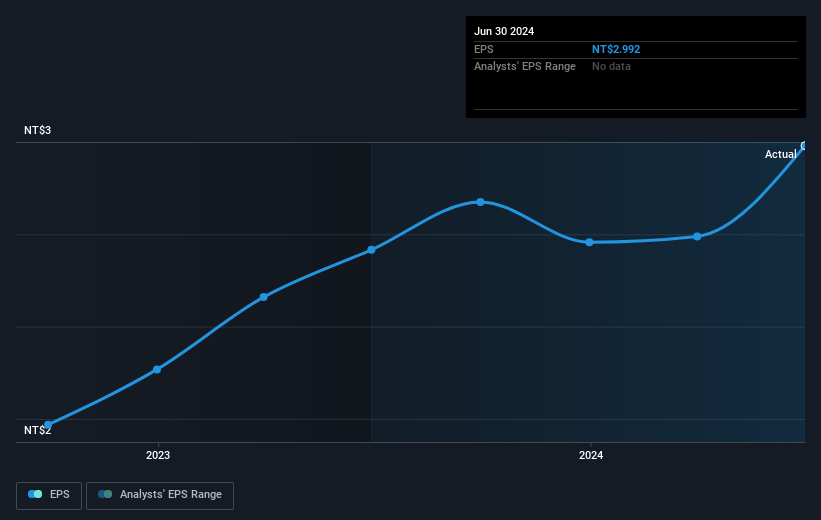Syscom Computer Engineering's (TWSE:2453) five-year earnings growth trails the 36% YoY shareholder returns

The most you can lose on any stock (assuming you don't use leverage) is 100% of your money. But on a lighter note, a good company can see its share price rise well over 100%. For example, the Syscom Computer Engineering Co. (TWSE:2453) share price has soared 261% in the last half decade. Most would be very happy with that. It's also up 14% in about a month.
After a strong gain in the past week, it's worth seeing if longer term returns have been driven by improving fundamentals.
See our latest analysis for Syscom Computer Engineering
In his essay The Superinvestors of Graham-and-Doddsville Warren Buffett described how share prices do not always rationally reflect the value of a business. By comparing earnings per share (EPS) and share price changes over time, we can get a feel for how investor attitudes to a company have morphed over time.
Over half a decade, Syscom Computer Engineering managed to grow its earnings per share at 25% a year. So the EPS growth rate is rather close to the annualized share price gain of 29% per year. Therefore one could conclude that sentiment towards the shares hasn't morphed very much. Indeed, it would appear the share price is reacting to the EPS.
The company's earnings per share (over time) is depicted in the image below (click to see the exact numbers).

Before buying or selling a stock, we always recommend a close examination of historic growth trends, available here.
What About Dividends?
When looking at investment returns, it is important to consider the difference between total shareholder return (TSR) and share price return. The TSR incorporates the value of any spin-offs or discounted capital raisings, along with any dividends, based on the assumption that the dividends are reinvested. So for companies that pay a generous dividend, the TSR is often a lot higher than the share price return. As it happens, Syscom Computer Engineering's TSR for the last 5 years was 368%, which exceeds the share price return mentioned earlier. This is largely a result of its dividend payments!
A Different Perspective
Syscom Computer Engineering shareholders gained a total return of 36% during the year. But that was short of the market average. On the bright side, that's still a gain, and it's actually better than the average return of 36% over half a decade It is possible that returns will improve along with the business fundamentals. It's always interesting to track share price performance over the longer term. But to understand Syscom Computer Engineering better, we need to consider many other factors. For instance, we've identified 1 warning sign for Syscom Computer Engineering that you should be aware of.
Of course Syscom Computer Engineering may not be the best stock to buy. So you may wish to see this free collection of growth stocks.
Please note, the market returns quoted in this article reflect the market weighted average returns of stocks that currently trade on Taiwanese exchanges.
New: Manage All Your Stock Portfolios in One Place
We've created the ultimate portfolio companion for stock investors, and it's free.
• Connect an unlimited number of Portfolios and see your total in one currency
• Be alerted to new Warning Signs or Risks via email or mobile
• Track the Fair Value of your stocks
Have feedback on this article? Concerned about the content? Get in touch with us directly. Alternatively, email editorial-team (at) simplywallst.com.
This article by Simply Wall St is general in nature. We provide commentary based on historical data and analyst forecasts only using an unbiased methodology and our articles are not intended to be financial advice. It does not constitute a recommendation to buy or sell any stock, and does not take account of your objectives, or your financial situation. We aim to bring you long-term focused analysis driven by fundamental data. Note that our analysis may not factor in the latest price-sensitive company announcements or qualitative material. Simply Wall St has no position in any stocks mentioned.
About TWSE:2453
Syscom Computer Engineering
Provides information technology services in Taiwan, China, the United States, and Southeast Asia.
Flawless balance sheet with proven track record.
Similar Companies
Market Insights
Community Narratives


